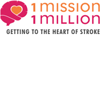€100,000 in reward donations for projects fundraising to prevent atrial fibrillation-related strokes
Posted: 23 May 2012 | | No comments yet
1 Mission 1 Million announces its plans to support ongoing work in atrial fibrillation…


Today the 1 Mission 1 Million – Getting to the Heart of Stroke initiative announces its plans to support ongoing work in atrial fibrillation (AF) by providing €100,000 in funding. Projects which aim to help prevent AF-related stroke will have the opportunity to be published on www.heartofstroke.com, a unique fundraising platform, hosted in partnership with the global fundraising expert ammado. The public will be able to donate to their favourite projects, and the first projects to reach 75% of their fundraising target, will receive the remaining 25% from the campaign sponsor, Boehringer Ingelheim (up to a value of €2,500).
Project submissions open today and fundraising will commence shortly thereafter, when 1 Mission 1 Million, supported by leading health experts and more than 40 patient and professional organisations, will encourage the public to donate to projects that help prevent AF-related stroke.
“This is a fantastic opportunity for anyone working in AF to rally the public to donate to their projects, with an extra incentive provided through additional funding”, said Trudie Lobban MBE, Founder & Chief Executive Officer of the Atrial Fibrillation Association. “One in four people aged 40 years or older develop AF, making it the most common sustained heart rhythm abnormality worldwide. 1,2 Projects implemented through this initiative could have a huge impact on people affected by the condition and Heart Rhythm Week is the perfect time to unite people in the fight against AF-related stroke.”
AF-related strokes are more severe and are associated with more disability than non-atrial fibrillation strokes. 3-5 However, many people are not fully aware of the increased risk of stroke associated with AF. 6
Petition for change from the World Health Organisation
In addition 1 Mission 1 Million has today launched a petition to call upon the World Health Organisation, its member states and health authorities worldwide to recognise atrial fibrillation as a risk factor for stroke and set clinical management targets that could save one million mothers, fathers, uncles, aunts and grandparents each year through better diagnosis atrial fibrillation management, stroke prevention and education. The global initiative is calling for at least one million members of the public around the world to provide their support and sign the petition at www.heartofstroke.com.
“It is vital that AF is recognised as a risk factor for stroke so that people affected by the condition receive the necessary treatment.” said Dr Kathryn Taubert, Chief Science Officer for the World Heart Federation (WHF). “As many as three million people worldwide have an AF-related stroke every year; this means one person every 10 seconds. Many of these strokes can be prevented so the WHF encourages everybody to join the mission and sign the petition to help save lives.”
Sharing inspiring stories
Finally, people who are affected by AF, care for someone with this diagnosis or work in the field are invited to share their AF stories, via the 1 Mission 1 Million initiative website, whether personal or professional, to inspire and encourage others around the world.
To submit a project, sign the petition or share a story, please visit www.heartofstroke.com.
References
- Lloyd-Jones DM, Wang TJ, Leip EP, et al. Lifetime risk for development of atrial fibrillation: the Framingham Heart Study. Circulation 2004; 110:1042-6.
- Stewart S, Murphy N, Walker A, et al. Cost of an emerging epidemic: an economic analysis of atrial fibrillation in the UK. Heart 2004; 90:286-92.
- Lin HJ, Wolf PA, Kelly-Hayes M, et al. Stroke severity in atrial fibrillation: the Framingham study. Stroke 1996; 27:1760-4.
- Kannel WB & Benjamin EF. Status of the epidemiology of atrial fibrillation. Med Clin North Am 2008;92:17-40.
- Kelly-Hayes M, et al. The influence of gender and age on disability following ischemic stroke: The Framingham Study. J Stroke Cerebrovasc Dis 2003; 12:119-266.
- SPEAK about AF Survey (2011) – ISBN 978-3-9814382-0-8.
- Goodacre S, et al. ABC of clinical electrocardiography. Atrial arrhythmias. Br Med J 2002; 324:594-7.
- Wolf PA, Abbott RD, Kannel WB. Atrial fibrillation as an independent risk factor for stroke: the Framingham Study. Stroke 1991; 22(8);983-8.
- Hart GR, et al. Meta-analysis: Antithrombotic therapy to prevent stroke in patients who have nonvalvular atrial fibrillation. Ann Intern Med 2007; 146:857-867.




